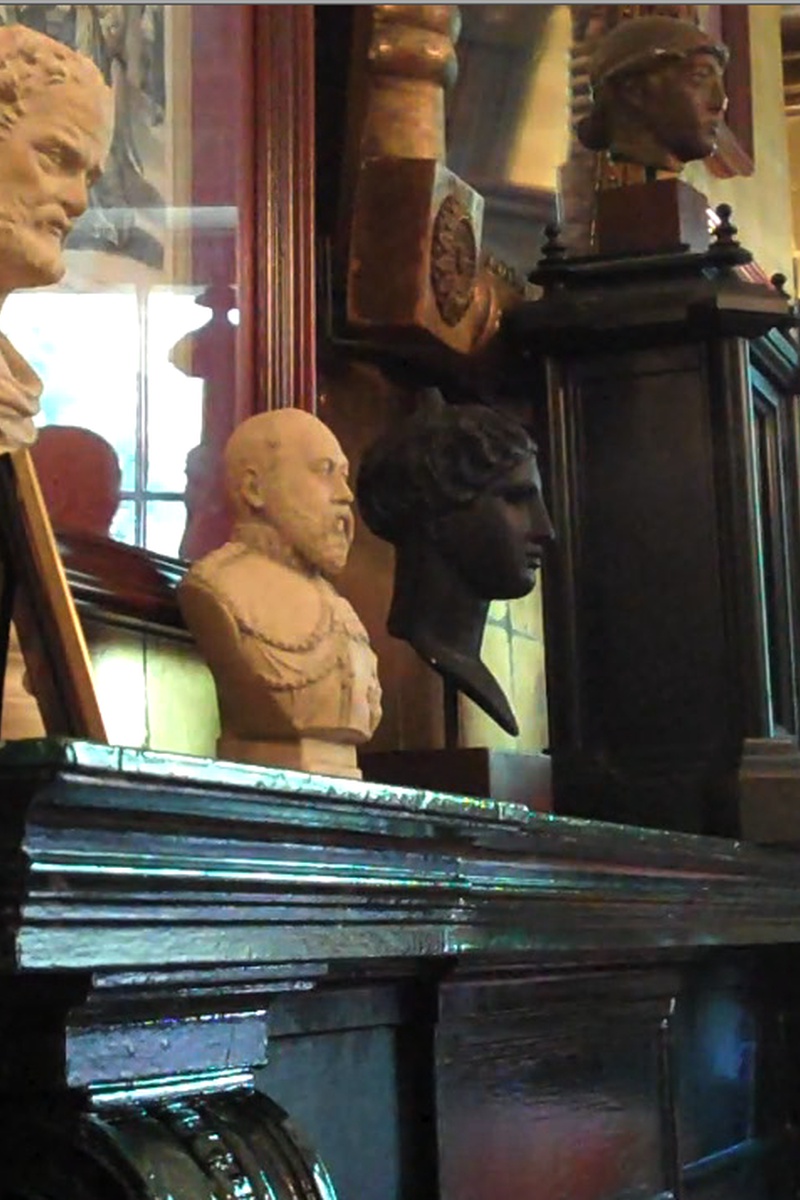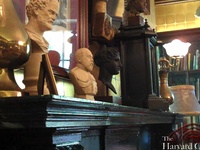The book is called ‘The Scandalous Gospel of Jesus: What’s So Good About the Good News.’ What’s so scandalous about it?” Stephen Colbert asked his guest on the show.
“I want to sell books,” the late Rev. Peter J. Gomes replied.
During a 2008 taping of “The Colbert Report,” Gomes turned the tables on the ordinarily quick-witted host. Hearing Gomes’ response, all Colbert could do was laugh.
Gomes would come to be known, in part, by his voice—its rich humor, its melody, its power, and its timbre. Though he died in February, his voice—and all that it stood for—will continue to resonate in the memory of those who knew him.
A gay, black, Baptist minister at Harvard, Gomes had great significance to many people during his 35 years as the Pusey Minister of Memorial Church and the Plummer Professor of Christian Morals. During that time, he became the University’s incomparable spiritual leader and leaves behind a profound legacy. He played an instrumental role in shedding light on Harvard’s history, speaking for the voiceless, spreading “the good news,” and forcefully rallying on behalf of justice.
Multimedia
AN INSTITUTION WITHIN AN INSTITUTION
Last year, Harvard Divinity School Professor Emeritus Harvey G. Cox Jr. decided to graze a cow in Tercentenary Theater, one of the rights associated with his endowed chair but one that had not been practiced in over 200 years.
Worried that security guards might interrupt the occasion, he consulted Gomes, a long-time friend.
Gomes responded with his typically powerful voice and self-assuredness.
“They would never dare,” he said, according to Cox.
Preserving Harvard’s history was an important mission for Gomes, who created the course Religion 1513: “The History of Harvard and Its Presidents.”
A frequent visitor to the Harvard Archives, Gomes would often pour through the annals of the University’s history, according to Jan C. Randolph, his long-time executive assistant who spoke during Gomes’ memorial service.
Even before he made history at Harvard, Gomes was considered Harvard’s historian, according to Timothy P. McCarthy ’93, a lecturer in History and Literature who has known Gomes since his time at the College.
“There was probably no one here at Harvard who knew the institution both experientially and historically the way Peter did,” McCarthy said.
With the portrait of Gomes hanging in the Nathan Pusey Room in Memorial Church, he has become a part of the Harvard history that he has sought to preserve.
“He was a Harvard icon, one of those larger than life personae that makes so rich the History of Harvard, to which he now belongs,” Andrew F. Saxe ’84, a close friend of Gomes, wrote in an email.
SHOUTS AND CHEERS
The crowd erupted in cheers as Gomes’ booming voice echoed his now famous declaration: “I am a Christian who happens as well to be gay.”
The year was 1992, and the United States was in the midst of a culture war.
Gomes’ coming out alongside other members of the faculty was a momentous occasion at Harvard—an institution in the middle of transition.
“[When he came out], he showed us how to be a particular kind of gay person in the world, not one that sort of conforms to stereotypes of what it means to be gay,” McCarthy said.
Although friends said that Gomes could never be limited to one part of his identity, such as his homosexuality, he did speak on the issue when his voice was most needed.
Gomes moved the audience to tears and wept himself as he delivered a sermon in 1998 after the horrific death of Matthew Shepard, a young gay man who was tortured and left to die tied to a fence in Montana, according to Lowell House Masters Diana L. Eck and Dorothy A. Austin.
Gomes stood in the spotlight in 2004 when he spoke before a crowd in the Massachusetts State House to advocate for gay marriage.
“The way to the future is always paved by extending, not restricting, liberties,” he wrote in an op-ed in the Boston Globe that year. “To extend the civil right of marriage to homosexuals will ... permit a whole class of persons both to benefit from a valuable yet vulnerable institution.”
But Gomes’ advocacy extended beyond issues of gay rights.
When the U.S. was on the verge of invading Iraq in 2003, Gomes stood in Forbes Plaza and exclaimed that the U.S. should not go to war, Austin recalled.
His outreach extended to students, who often sought his guidance in personal affairs.
Once, a student approached Gomes for advice after his parents committed suicide on separate occasions. In another instance, a student came to him for support after a friend at the College had been murdered in a fight in Boston.
“That was the worst tragedy I had ever experienced in my life,” said Robert Sackstein ’77, the student whose friend had been killed and who is now a professor at the Medical School. “He just so compassionately guided my recovery. He really pulled me through.”
Those close to him said that Gomes’ door was always open to students and that when they walked into his office he always took the time to steer them in the right direction.
“When he talked to a student, he or she would think he was the only person on this whole earth,” Randolph said.
RELIGION AT HARVARD
A skilled preacher, Gomes was a master at the art of the pause, Epps Fellow Nathaniel P. Katz said.
“What made him extraordinary was his ability to synthesize the gospel or the text in such a way that was both meaningful and relevant and memorable,” Katz said. “I’ve never seen a greater extemporaneous speaker all of my life.”
His powerful Sunday sermons helped maintain a religious presence at Harvard, while interest in churches diminished at other universities.
When Gomes was appointed the Pusey minister at Memorial Church in 1974, religion’s popularity across the United States was at a low point, especially on college campuses, said Jonathan C. Page ’02, a former Epps fellow.
At the time, Harvard, as an institution, was known for its lack of religious fervor, Page said. Gomes wanted to change that.
He insisted that religion be an option for undergraduates on campus by creating an atmosphere open to the practice of religion and supporting other religious groups as well.
During his tenure, Gomes turned Memorial Church into a center of religious and student life, a place where people of different religious convictions could feel welcome and practice under the same roof.
“He left an institutional legacy in that fact that Memorial Church has always been an important centerpiece of Harvard’s culture institutionally,” McCarthy said, “but it serves a broader public and a broader world.”
McCarthy added that this was no small feat in an age when religious debates were often “so violent and so vicious.” Gomes would ensure that religion continues to exist at Harvard in the long run.
His enthusiasm for religion at Harvard carried over into the class he taught about preaching, a course in which he sought to pass on his talent for oratory.
Gomes would tell his students to seek the diamond instead of the string of pearls—to find one thing worth saying and to say it multiple times.
“Love—not the romantic sense of love but the sense of unconditional love that we receive from God—should be the center of what we do and who we are,” Katz said was one of Gomes’ most important lessons.
Katz said that Gomes believed anyone who comes to Harvard should feel like they have something to contribute to the Harvard tradition—they can come here and feel like Harvard belongs to them, sharing a love of Harvard through the love of God.
“The love that we receive is a gift. It’s great. We don’t have to do anything to earn it,” Katz said. “God’s gift to us is this unconditional love.”
Whether it be for the student who had lost a friend, a young man in need of a role model, or each new crop of incoming freshmen, Gomes, too, possessed an unconditional love. It could be heard in his voice.
—Staff writer Justin C. Worland can be reached at jworland@college.harvard.edu.
—Staff writer Xi Yu can be reached at xyu@college.harvard.edu.
Read more in News
Laughs, Nostalgia Expected at Class Day














